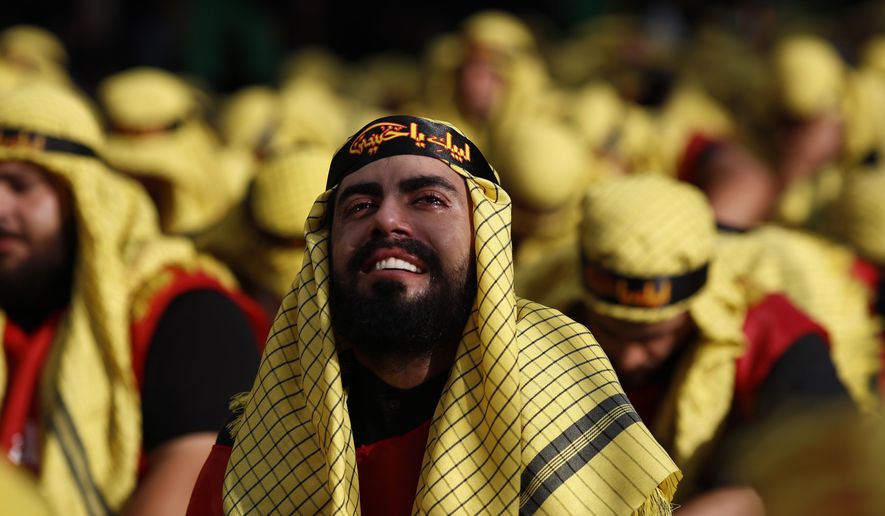U.S. officials elevated their public condemnation of Hezbollah on Tuesday, adding two of the Iran-backed terror group’s top operatives to a special State Department most-wanted list and asserting that all of the group’s factions — even those holding political office in Lebanon — are part of the same terrorist operation.
“Make no mistake, Hezbollah has no political wing. It is a single organization, a terrorist organization and it is rotten to it’s core,” State Department Counterterrorism Coordinator Nathan Sales told reporters in a briefing that dovetailed with an ongoing Trump administration push to announce a more hawkish U.S. posture toward Iran.
As part of that push, Mr. Sales, who appeared at Foggy Bottom Tuesday alongside National Counterterrorism Center Director Nicholas Rasmussen, said the U.S. government is now offering $12 million for information leading to the apprehension of Hezbollah operatives Talal Hamiyah and Fu’ad Shukr.
Hamiyah is alleged to head Hezbollah’s External Security Organization, which the State Department says maintains terror cells worldwide. Shukr is alleged to be a senior operative, who played a central role in the 1983 bombing of U.S. Marine barracks in Beirut that killed 241 American personnel. The two mark the first time in a decade that anyone from Hezbollah has been added to the State Department’s special “Rewards for Justice” list.
During Tuesday’s briefing, Mr. Sales and Mr. Rasmussen stressed that the U.S. government, which has listed Hezbollah as a terrorist organization since October 1997, does not distinguish between the group’s various factions.
“The position of the United States is clear. Hezbollah is a terrorist organization from A to Z and we don’t recognize a false distinction between its terroristic ambitions and its political role,” said Mr. Sales.
It’s an assertion that could prove tricky for the Trump administration’s ongoing relations with Lebanon, a recipient of significant military aid from Washington.
Hezbollah not only maintains a major militia presence in Lebanon, it also claims to have achieved a sustainable degree of political legitimacy there during recent years. Presently, Hezbollah holds 12 seats in Lebanon’s parliament.
The situation grew more complicated Tuesday, when Israel’s Defense Minister Avigdor Lieberman made international headlines by claiming that Hezbollah has grown so strong in Lebanon that neighboring Israel now believes the group actually controls the Lebanese Army.
“The Lebanese army has turned into an integral part of Hezbollah’s command structure. The Lebanese army has lost its independence and become an inseparable part of the Hezbollah apparatus,” Mr. Lieberman said, according to a report by Reuters.
Mr. Sales and Mr. Rasmussen avoided questions about the Israeli defense minister’s statement. “We are aware of the report and we are looking into it,” said Mr. Sales.
Prior to Tuesday, the Trump administration had toed a careful line toward Lebanon. Following a visit to Washington by Lebanese Prime Minister Saad Hariri in July, the administration signaled it would proceed with U.S. military aid to the country.
The Pentagon has said Washington has provided Lebanon with more than $1.5 billion in military assistance since 2006, and U.S. special forces have been providing “training and support” for the Lebanese army since 2011, according to Reuters.
• Guy Taylor can be reached at gtaylor@washingtontimes.com.




Please read our comment policy before commenting.